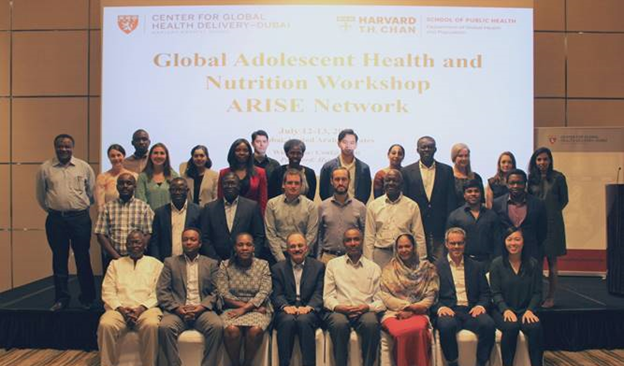Date:
Location:
 The Nutrition and Global Health Program at the Harvard T.H. Chan School of Public Health hosted a two-day workshop focused on global adolescent nutrition and health in Dubai, UAE. Convening 30 members and colleagues of the Africa Research, Implementation Science, and Education (ARISE) Network, the workshop focused on the current state and on the future of research, training, capacity building, and interventions for adolescent nutrition and health in the African continent and India. The meeting was supported by the Harvard Medical School Center for Global Health Delivery–Dubai.
The Nutrition and Global Health Program at the Harvard T.H. Chan School of Public Health hosted a two-day workshop focused on global adolescent nutrition and health in Dubai, UAE. Convening 30 members and colleagues of the Africa Research, Implementation Science, and Education (ARISE) Network, the workshop focused on the current state and on the future of research, training, capacity building, and interventions for adolescent nutrition and health in the African continent and India. The meeting was supported by the Harvard Medical School Center for Global Health Delivery–Dubai.
A collaborative effort between leading African institutions, the ARISE Network is a platform for robust research and cutting-edge education. ARISE has 21 member institutions from nine countries in sub-Saharan Africa. Together, this group of distinguished colleagues is working toward a common goal: to develop the next generation of leaders tackling Africa’s most pressing health challenges. Adolescent health is one of the Network’s key focus areas, as its chronically underfunded and understudied nature requires careful attention and tailored approaches.
The workshop opened with an introduction and welcome from Nasreen Adamjee, Director of Research and Programs at Harvard Medical School Center for Global Health Delivery–Dubai. Wafaie Fawzi, Harvard T.H. Chan School of Public Health, Professor of Nutrition, Epidemiology, and Global Health, gave an overview of the Network and reviewed the agenda for the workshop. Through a combination of presentations, discussions, and break-out sessions, the workshop aimed to achieve the following objectives:
- Review the current state of evidence on global adolescent nutrition.
- Discuss opportunities to fill gaps in evidence on adolescent nutrition and health at the community level and within schools.
- Examine ongoing plans for interventions within the school context.
- Consider ideas for integrated solutions to advance adolescent nutrition and health, as well as proposals to pursue in these areas.
- Discuss next steps for further analysis of ARISE data, training and capacity building, and dissemination of findings.
- Plan for regular and continued engagement of the Network.
Workshop participants highlighted the ongoing efforts toward bolstering research in adolescent health, including a recently completed ARISE survey in seven countries in sub-Saharan Africa. The Network has submitted a special issue comprised of 14 manuscripts to a leading public health journal, which is currently under review. During the workshop, participants examined the gaps in current evidence and opportunities for additional analyses from these datasets, including collaborative multisite manuscripts.
In addition, the Network proposed selecting and standardizing a core set of questions in the domains of mental health, physical health including nutrition, sexual and reproductive health, service utilization, substance use, and sexual violence. These questions will be used across all ARISE sites and potentially for adoption by national Health and Demographic Surveillance Systems (HDSS), which monitor key population-based health indicators. Currently, the Network is forming subgroups by topical area to narrow down the proposed questions and is developing a paper on methodologic issues related to tracking adolescent health in longitudinal surveys within HDSS sites.
During the workshop, updates were provided on an ongoing UNICEF-funded ARISE Network study on the impact of the school environment on nutrition and health among urban, in-school adolescents ages 10-14 years in Ethiopia, Sudan, and Tanzania. Additional sites include Burkina Faso and South Africa. The study team received feedback on their progress and challenges from workshop participants.
The workshop participants discussed the need for further studies on the effectiveness and evidence base around micronutrient supplementation among adolescents, as well as the evidence base and programmatic elements related to school feeding programs. Results were shared from a recent study in Ghana on weekly iron folic acid supplementation among adolescent girls, and lessons from national school meal programs helped to inform discussion on adoption of these approaches in ARISE sites.
Finally, the workshop highlighted solutions for adolescent health and nutrition, including intervention packages focused on school climate in India, an empowerment and agency intervention in Ethiopia, potential interventions addressing the double burden of over nutrition and under nutrition, digital solutions for improving mental health in India, approaches to youth engagement, and indicators to measure cognitive development and academic achievement among adolescents.
Number of Participants: 30
Number of Countries: 12
Countries Represented: Burkina Faso, Ethiopia, Germany, Ghana, India, Nigeria, South Africa, Sudan, Tanzania, Uganda, United Kingdom, United States of America
